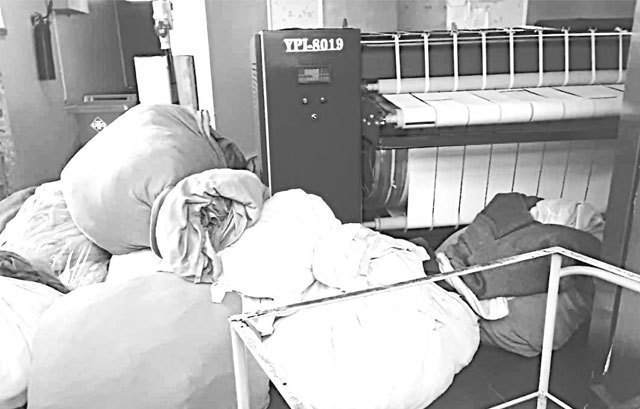By Samkelo Mahlalela | 2018-12-06

Once again, the Kingdom of Eswatini joined the global community in commemorating World AIDS Day (WAD)on December 1, 2018 at an event that was held at Mayaluka Stadium in Big Bend.
World AIDS Day is commemorated in remembrance of those we have lost their lives to AIDS; To galvanise all those who live with HIV to continue to live positively using the available treatment; To urge everyone to support those living with HIV to thrive as part of our families, societies and contributors to all aspects of development; and to mobilise everyone to stop new HIV infections.
Those living with HIV have a responsibility not to transmit and those who are not infected have the responsible not to acquire HIV. This is a massive but achievable task. The secret lies in the small things we do daily, which become habit and contribute to defeating HIV and AIDS in the long run. Preventing new HIV infections or living positively with HIV is an everyday decision – and an every-moment decision.
In his maiden statement on the National Multisectoral Response to HIV and AIDS, His Excellency the Right Honourable Prime Minister, Mr Ambrose Mandvulo Dlamini affirmed government’s commitment to work with all partners to ensure that Vision 2022 of ending AIDS as a public health threat in the kingdom is realised, saying ‘This is the crown we should all strive for’. Making remarks at the commemoration event, the Acting United Nations Resident Coordinator, Dr Alice Akunga noted that 30 years after the first commemoration, the response to HIV stands at crossroads, and it is the direction we take that will define the course of the epidemic – whether the world will end AIDS by 2030 (brought forward to 2022 in Eswatini), or whether future generations will carry to bear the burden of this devastating disease. Globally, more than 77 million people have been infected with HIV and more than 35 million have died of an AIDS-related illness. Huge progress has been made in diagnosis and treatment, and prevention efforts have prevented millions of new infections.
For Eswatini, the HIV and AIDS response has come a long way. HIV and its dire impact have been with us for over 30 years now. Our biggest and winning weapon has been our approach - that is, we have played an offensive game from the time His Majesty King Mswati III proclaimed HIV and AIDS a national disaster. This approach has achieved many gains, visibly seen by many people who live healthy with HIV after knowing their status; It has led to a majority of those living with HIV enrolling on treatment and taking ARVs; and for a good measure, several of them are virally suppressed and have reduced chances to spread the disease. People living with HIV have played their role to the fullest, to secure their lives, those of their families and their future. Everyone has played an offensive game in reducing new infections, with over 40% new infections reduced since 2011. Projections show that we will continue to reduce new infections for as long as we keep at what we are doing – but the target for the year 2022 demands that we put more effort. This spirit is reflected in the targets set for the new National Multisectoral HIV and AIDS Strategic framework, 2018-2023, to reduce new HIV infections by 85% in 2022.
To achieve this, we need to see HIV and AIDS the same manner as we used to see it years back, necessitating focus and action because the associated risks have not diminished but instead, we need to continue to view HIV and AIDS as an emergency because if we do not, we risk complacency, we risk a loss of focus and when that happens, we may see its resurgence. It is possible and has occurred in one or two African countries, whose HIV problem rebounded as observed by increasing new infections.
Increase
The fact is, to date, one in three people in Eswatini are living with HIV and, this needs to at least remain so. We cannot afford to have it increase as it would mean that we have lapsed and are not reducing new infections, thereby increasing the number of people living with HIV.
As a country, we understand that there are some of critical gaps that need to be closed in order to reach epidemic control. For one, we know that we have pockets of people that we need to reach for them to know their status. We know that these are mostly men, young people under 15 years and key populations. We need to intensify efforts to encourage these to know their status,
Once HIV positive men, young people and key populations get tested and know their status, they will be linked to both prevention and treatment services. HIV negative populations will be offered services to remain negative. Knowing one’s status allows a person to understand what they need to do after. Fear is natural and overcoming that fear is important because if we fear, we may even miss the opportunities we need to lead productive and prosperous lives. The key message for the World AIDS Day Campaign which will run until November 2019 is ‘Know Your HIV Status… It will be Okay!’. It will be okay because, whatever the situation, there are available services to ensure that you are okay.
The HIV and AIDS response calls on all citizens young and old, private sector, civil society organisations, developing and funding partners to continue to partner with the His Majesty the King’s Government and work even closer.
The onus is on all of us to be on the alert and keep putting efforts to end AIDS as public health threat and reach epidemic control. The pressing game means that we play to the whistle and until the whistle is blown, signalling that we have reached the end of AIDS, no one can relax. At this point, we need to be even more alert, and guard against every effort trying to let us lose focus. We must be even more concerted knowing that we are capable of defeating HIV and AIDS. We should gain motivation and push on the momentum thus far to be even more coordinated. This is the one sure way to ensure synergised efforts blocking every door possible for the resurgence of HIV and AIDS.
Today, Multisectoral Response leaves you dear reader, with the motivating quote from the 2005 movie, ‘Coach Carter’ starring the legendary Samuel L. Jackson, attributed to the character of Timo Cruz who said:
“Our deepest fear is not that we are inadequate. Our deepest fear is that we are powerful beyond measure. It is our light not our darkness, that most frightens us. Your playing small does not serve the world. There is nothing enlightened about shrinking so that other people won’t feel insecure around you. We are all meant to shine as children do. It’s not just in some of us, it is in everyone. And as we let our lights shine, we unconsciously give others permission to do same. As we are liberated from our own fear, our new presence automatically liberates others”. While the government, communities and partners will do their part, Emaswati are urged to overcome that fear and go for a health and HIV test. This will set you free. And in the process, you will allow those you care for the same freedom.
share story
Post Your Comments Below

SOCCER - LIVING on borrowed time!
For the first time in history of local football, two of...

BEAUTY Pageant Eswatini Chairman, Sandra Ismail, officially passed over the Miss Eswatini title t...

While things are falling apart at the Pigg’s Peak Government Hospital, the ministry of heal...

Status Capital Building Society shareholders are once again being asked to take part in an audaci...
All material © Swazi Observer. Material may not be published or reproduced in any form without prior written permission.
Design by Real Image Internet